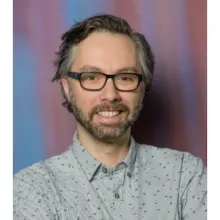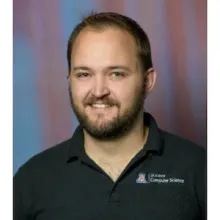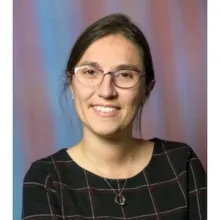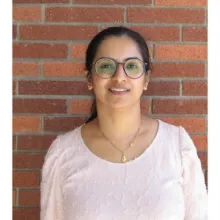2020 Data Science Fellows Fostered Skills Across UArizona Campus
Undeterred by the year's significant challenges, a group of postdoctoral researchers at CyVerse and UArizona's Data Science Institute prevailed to bring new achievements to a range of research disciplines through a novel fellowship program.

The 2020 Data Science Fellows met with program leaders at CyVerse headquarters at UArizona's BIO5 Institute in early 2020 (pre-COVID19). From left: Gustavo de Oliveira Almeida, Alex Bigelow, Alise Ponsero, Ryan Bartelme, Eric Lyons, and Maliaca Oxnam.
In Spring of 2020, CyVerse and the University of Arizona's Data Science Institute welcomed a diverse cohort of Data Science Fellows, a group of postdoctoral researchers who participated in the dynamic program to develop, exchange, and foster data science expertise to solve cutting-edge research challenges in health and biomedical arenas.
The Fellowship program was funded primarily by the University of Arizona Health Sciences as part of the Health Analytics Powerhouse strategic initiative to centralize data science services and cross-disciplinary collaborations at UArizona in order to further health sciences research and achievements.
"The Data Science Fellows program has been focused on building data science capabilities and capacities for UArizona Health Sciences and for life sciences broadly at UArizona," said Eric Lyons, co-principal investigator of CyVerse and one of the originators of the fellowship. "There are amazing projects leveraging data science all across campus. The purpose of this program was to bring together cohorts of postdocs from computational, health, and life sciences to facilitate communication, collaboration, and the exchange of technologies and best practices across these domains."
CyVerse and UArizona's Data Science Institute co-hosted the Fellows, who served to further both projects' missions of building data science capacity by contributing novel training, consulting, and domain-specific expertise to the community.
The Fellows also provided a postgraduate complement to UArizona's existing Data Science Ambassadors program, in which doctoral candidates with data science skills provide a first line of support in their home colleges and departments.
"Data science is team science," said Data Science Institute Director and CyVerse co-principal investigator Nirav Merchant, "and the diversity in expertise of the team is really critical to solving cutting-edge scientific challenges. The Data Science Fellowship brought together fellows with different skillsets, research questions, and areas of expertise."
*****

Dr. Gustavo de Oliveira Almeida
Almeida earned Bachelor's degrees in business from the Federal Rural University of Rio de Janeiro and information systems from Open Superior School of Brazil, a Master's of Business Administration from Federal University of Rio de Janeiro, and a PhD in business from the Getulio Vargas Foundation. He also obtained a graduate certificate in systems engineering from Open Superior School of Brazil. Almeida is currently working towards a second PhD in informatics at the Federal University of Rio de Janeiro State, as well as holding a professorship position in the Graduate Program of Business Administration at Federal Fluminense University and a postdoctoral position with Win Burleson in UArizona's School of Information, where he works with the UArizona New York University Holodeck Node, an experiential supercomputer that generates an immersive, collaborative, virtual and physical research environment.
He joined the Data Science Fellows interested in multidisciplinary collaboration and bridging applications in health and data science. Almeida specialized in multimodal data streams under the mentorship of Joshua Levine of the Department of Computer Science. Adapting to the new normal of virtual, remote research, Almeida developed a remote sensing research kit comprising a heart rate sensor that connects to a phone application. The data from the kit can be used for virtual healthcare trainings, to monitor the emotional engagement of the trainee with the simulation environment and improve upon the trainings. Almeida's next endeavor is to coordinate the launching of UArizona's new Healthcare Technology Innovation Lab advancing sensor development and testing for health sciences.
Dr. Ryan Bartelme
Bartelme earned a Bachelor's degree in microbiology from the University of

Wisconsin-Madison, where he studied pathogenic fungi. He completed his PhD in freshwater sciences at the University of Wisconsin-Milwaukee, where he examined high-density microbial community structures in aquaculture and aquaponic systems.
As a Data Science Fellow, Bartelme specialized in metagenomics and digital health under the mentorship of Duke Pauli in the School of Plant Sciences, working in an area he calls the "front end of healthcare" to develop an intellectual framework that can easily be adapted to medical applications. "It doesn't matter if it's a metastasized cancer cell or a plant in the field, getting from genomic information to an actual phenotype is a similar process," he said. Bartelme also worked with David LeBauer analyzing data generated by UArizona's TERRA-REF project, to develop a model that correlates environment, genes, and plant phenotypes. In addition, Bartelme is a postdoctoral researcher in the lab of Bryan Heidorn of the School of Information, where he works on developing methods of predicting plant phenotypes from genomic data and environmental variables.

Dr. Alex Bigelow
Completing both undergraduate and graduate studies in computer science at the University of Utah, Bigelow's educational focus was on human-computer interaction: discovering how to talk to domain scientists to figure out how to build the computer visualizations they needed to do their science. Bigelow later transitioned to UArizona for a postdoc position with Katherine Isaacs in the Humans, Data, and Computers Lab. Studying data abstraction and visualization, he works with researchers to determine how their data models might affect their creativity with regard to the types of questions they might ask. For example, he said, if given a table, people tend to ask tabular questions: "Data itself is this arbitrary design choice. I'm really interested in learning how people think about their data, and how that influences the science that they do. If they structured the data differently, would they ask different questions?"
As a Data Science Fellow, Bigelow worked with mentor Alex Thome of the Evelyn F. McKnight Brain Institute. His achievements during 2020 include publication of a paper on data abstractions, development of an app, along with UArizona research computing specialist Devin Bayly, to help find housing for self-quarantining healthcare workers for the Tucson, Ariz., nonprofit HCW Hosted, and a project for visualizing the performance of programs running on high performance computing clusters.
Dr. Alise Ponsero
Ponsero earned her Master's degree in computer science and PhD in molecular

biology from the Université Paris-Saclay, France, a background which gave her the skills to merge domain and data sciences writing code to develop new computational approaches to compare metagenomes. Specializing in machine learning and metagenomics, Ponsero's role as a Data Science Fellow complemented her postdoctoral position with Bonnie Hurwitz working on Planet Microbe, a Powered-by-CyVerse project that interlinks microbiome datasets with their oceanographic environmental and physiochemical contexts.
Ponsero and Hurwitz were selected as part of the cohort for UArizona's 2020 CURE Training Institute, which engages undergraduate students in real-world research experiences, including providing a generalized curriculum for data sciences. In the past year, Ponsero has worked in collaboration with her mentor Clayton Morrison of UArizona's School of Information to develop machine learning algorithms that retrieve viral sequences in metagenomes. Her work has applications in all areas, from health to environmental microbiology. Ponsero is now transitioning to a postdoctoral research position studying human gut metagenomics at the University of Helsinki, Finland.

Dr. Reetu Tuteja
Tuteja earned her Master's degree in bioinformatics from Banasthali University and PhD in plant sciences and bioinformatics from the National University of Ireland, Galway. Tuteja completed a postdoctoral fellowship in the Plant Systems Biology Lab of Gloria Coruzzi at New York University. She is currently a CyVerse Science Analyst, where she trains researchers in how to use CyVerse cyberinfrastructure, provides user support, helps improve platforms and services, and creates documentation. Her research interests include the origination of new genetic material and its role in plant adaptations, and, she said: "I write code for fun."
As a Data Science Fellow, Tuteja worked with Lyons on projects in high-throughput sequencing analysis, plant bioinformatics, and scientific programming, including developing an analytics portal for CyVerse.
*****
The Data Science Fellows program was led by Lyons, who is also an associate professor in UArizona's College of Agriculture and Life Sciences (CALS) and at the BIO5 Institute, and Maliaca Oxnam, Deputy Director of the Data Science Institute. Additional funding for the program was provided by CyVerse and CALS.

